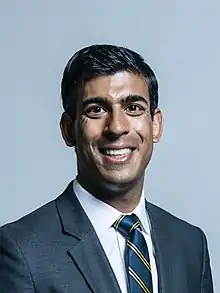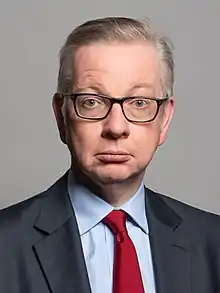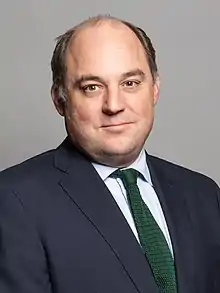National Security Council (United Kingdom)
The National Security Council (NSC) of the United Kingdom is a Cabinet Committee tasked with overseeing all issues related to national security, intelligence coordination, and defence strategy. The terms of reference of the National Security Council are to consider matters relating to national security, foreign policy, defence, cyber security, resilience, energy and resource security.[1]
.svg.png.webp) | |
| Committee overview | |
|---|---|
| Formed | 12 May 2010 |
| Committee executive |
|
| Parent department | Cabinet Office |
| Website | National Security Council |
History
The National Security Council was established on 12 May 2010 by Prime Minister David Cameron. The NSC formalised national security decision making, which had previously been carried out in informal groups largely composed of officials. It increased the power of the Prime Minister, who chairs the Council, and brought senior Cabinet ministers into national security policy making, giving them access to the highest levels of intelligence.[2] It reflects the central coordination of national security issues seen in the Committee of Imperial Defence,[3] which operated from 1902 until 1947, while also being partly modelled on the United States National Security Council.[2]
The Council is a Cabinet committee; it coordinates responses to threats faced by the United Kingdom and integrates at the highest level the work of relevant government entities with respect to national security.[4] The UK's National Security Adviser (NSA) is secretary to the council. The NSA role is currently held by Sir Mark Sedwill, who commenced work as the UK's fourth NSA in April 2017. In October 2018, Sedwill became Cabinet Secretary and it was subsequently reported that he would be expected to combine the NSA role with his new responsibilities as Cabinet Secretary (United Kingdom) and Head of the Home Civil Service.[5] However, as of July 2019, he retains dual appointments.
From 1 April 2015 the council oversaw the newly created Conflict, Stability and Security Fund, a fund of more than £1 billion per year for tackling conflict and instability abroad.[6] Following a critical inquiry into the fund by the Joint Committee on the National Security Strategy in 2016,[6] where the committee stated that the fund was secretive and "There is a risk that the CSSF is being used as a ‘slush fund’ [for projects that do not] meet the needs of UK national security", fund spending at the country level was disclosed and an annual report produced.[7]
In April 2019, an inquiry, which could lead to criminal proceedings, was announced into the leaking to the Daily Telegraph of a decision by the NSC to allow Huawei to bid for 'non-core' elements of the construction of the prospective 5G network.[8]
The council met weekly during the administrations of David Cameron and Theresa May, but meets very infrequently under Prime Minister Boris Johnson and not at all during the COVID-19 pandemic.[9]
Membership
As of 29 June 2020, the NSC's membership is as follows:[10]
The NSC is to consider matters relating to national security, foreign policy, defence, international relations and development, resilience, energy and resource security.
Other government ministers, senior officials, military and intelligence officers attend as necessary, some on a regular basis. The Chief of the Defence Staff represents the Chiefs of Staff Committee at the NSC, not individual Chiefs of each service.[11] There are three subcommittees of the NSC,[12] Nuclear Deterrence and Security, Threats, Hazards, Resilience and Contingencies, and Strategic Defence and Security Review Implementation. The Leader of the Opposition has attended on an occasional basis.
Council Subcommittees
There were until November 2019, several sub-committees in the NSC after which, they ceased to exist.[13] Only the Nuclear Deterrence and Security sub-committee was re-constituted as of 29 June 2020.[14]
Nuclear Deterrence and Security Sub-Committee
Terms of Reference: To consider issues relating to nuclear deterrence and security.
| Office(s) |
|---|
| Prime Minister (Chair) |
| Chancellor of the Exchequer |
| Foreign Secretary and First Secretary of State |
| Home Secretary |
| Defence Secretary |
| Business, Energy and Industrial Strategy Secretary |
Threats, Hazards, Resilience and Contingencies Subcommittee
The Threats, Hazards, Resilience and Contingencies Subcommittee was a subcommittee of the National Security Council with the terms of references to consider issues relating to terrorism and other security threats, hazards, resilience and intelligence policy and the performance and resources of the security and intelligence agencies; and report as necessary to the National Security Council.[15]
Strategic Defence and Security Review Implementation Subcommittee
The Strategic Defence and Security Review Implementation Subcommittee was a subcommittee of the National Security Council with the terms of references to consider matters relating to implementation of the Strategic Defence and Security Review (SDSR) and National Security Strategy.[15]
Cross-Government Funds Subcommittee
The Cross-Government Funds Subcommittee was a subcommittee of the National Security Council with the terms of references to provide strategic direction to the Conflict, Stability and Security Fund and the Prosperity Fund.[15]
National Security Secretariat
The size and shape of the National Security Secretariat (NSS) and its senior leadership has fluctuated since its inception in May 2010. From July 2010, there were two Deputy National Security Advisers (DNSAs): Julian Miller for Foreign & Defence Policy and Oliver Robbins for Intelligence, Security & Resilience.[16] By March 2013, Hugh Powell - previously a National Security Secretariat Director - had been promoted to a newly created third DNSA position.[17] As of 6 November 2014, there were three DNSAs: Hugh Powell as DNSA (Foreign Policy), Julian Miller as DNSA (Defence, Nuclear and Strategy) and Paddy McGuinness as DNSA (Intelligence, Security & Resilience).[18] As of early December 2014, the National Security Secretariat was staffed by 180 officials[19] and comprises five directorates: Foreign & Defence Policy; the Civil Contingencies Secretariat; Security & Intelligence; the Office of Cyber Security and Information Assurance, and UK Computer Emergency Response Team (CERT UK).[18] As of 10 February 2015, Liane Saunders - previously the National Security Secretariat's Director for Foreign Policy and its Afghanistan/Pakistan Coordinator - was described as an Acting Deputy National Security Adviser (Conflict, Stability and Foreign Policy).[20]
On 16 June 2016, the Cabinet Office released staff data, correct as of 31 March 2016, listing two current Deputy National Security Advisers: Paddy McGuinness (responsible for Intelligence, Security and Resilience) and then Brigadier Gwyn Jenkins (responsible for Conflict, Stability & Defence).[21] Jenkins appeared to have been in post since at least June 2015.[22] Prior to becoming a deputy National Security Adviser, Jenkins was the military assistant to prime minister David Cameron.[23]
As of April 2017, it was announced that a diplomat, Dr Christian Turner CMG, had replaced Jenkins as the second Deputy National Security Adviser, with a portfolio comprising 'foreign and defence policy.'[24] According to one of Turner's tweets, dated 13 April 2017, his first week as Deputy National Security Adviser was the week commencing Monday 10 April 2017.[25] Turner is now the High Commissioner to Pakistan.[26] Turner was replaced by David Quarrey in July 2019.[27]
It was reported on 14 January 2018 that Paddy McGuinness was leaving the national security secretariat.[28] His successor as deputy national security adviser for intelligence, security and resilience, Richard Moore, announced his appointment on 8 January via his personal Twitter account.[29] Moore’s tenure as deputy NSA was relatively brief (circa three months), ending in early April when he returned to the Foreign and Commonwealth Office as Political Director, a move he also announced via Twitter on 8 April.[30] Although unconfirmed publicly by the UK government, Madeleine Alessandri had replaced Moore as the second deputy national security adviser.[31] However, in September 2018, Alessandri's name and appointment was mentioned in a government response to the Intelligence and Security Committee of Parliament and a list of government salaries.[32][33] Alessandri apparently took up her appointment in July 2018.[34]Alessandri has left her Deputy NSA post to work in the Northern Ireland Office in January 2020.[35] Alessandri has been replaced by Beth Sizeland [36] while Alex Ellis has also been added as a deputy with the title 'Deputy National Security Adviser for the Integrated Review on diplomacy, development and defence'.[37] Sizeland's appointment was confirmed in an oral evidence by Mark Sedwill, however, as of 25 May 2020, her appointment has not been updated on the Cabinet Office website.[38]
As of October 2020, Quarrey has taken over the post of acting NSA while David Frost remains Chief Negotiator for the EU talks. [39]
On 29 January 2021, it was announced that Stephen Lovegrove not Lord Frost would be appointed as National Security Adviser.[40]
See also
References
- "National Security Council".
- Snell, Arthur (2019-04-27). "David Cameron made the Huawei leak possible". POLITICO. Retrieved 2019-04-30.
- Dr Joe Devanny & Josh Harris (2014-11-04). "The National Security Council: national security at the centre of government". The Institute for Government. Institute for Government & King's College London. Retrieved 6 November 2014.
- "Press Notice: Establishment of a National Security Council". Prime Minister's Office. 12 May 2010. Archived from the original on 9 January 2013.
- James Blitz (14 February 2019). "Head of UK civil service confirms permanent dual role". Financial Times.
- "Conflict, Stability and Security Fund inquiry launched". Joint Committee on the National Security Strategy. UK Parliament. 26 May 2016. Retrieved 26 November 2016.
- Travis, Alan (6 March 2017). "Amber Rudd asked to reveal where secret £1bn conflict fund is spent". The Guardian. Retrieved 12 June 2017.
- "Huawei row: Inquiry to be held into National Security Council leak". BBC News. 25 April 2019. Retrieved 26 April 2019.
- Sabbagh, Dan (12 May 2020). "UK national security council has not met since January". The Guardian. Retrieved 12 May 2020.
- "List of Cabinet Committees and their membership as at 29 June 2020" (PDF). assets.publishing.service.gov.uk. Cabinet Office. 29 June 2020. Retrieved 29 June 2020.
- "House of Commons - Decision-making in Defence Policy - Defence". Retrieved 24 July 2016.
- "Cabinet Committee Memberships" (PDF). Cabinet Office HM Government. June 2010. Archived from the original (PDF) on 2010-11-10. Retrieved 5 August 2010.
- "FOI Reference:FOI328864" (PDF). What do They Know. 11 November 2019. Retrieved 13 February 2020.
At present the sub committees Nuclear Deterrence and Security Subcommittee, Threats, Hazards, Resilience and Contingencies Subcommittee, Strategic Defence and Security Review Implementation Subcommittee, and Cross-Government Funds Subcommittee do not exist
- "List of Cabinet Committees and their membership as at 29 June 2020" (PDF). assets.publishing.service.gov.uk. Cabinet Office. 29 June 2020. Retrieved 29 June 2020.
- Archived 2018-10-29 at the Wayback Machine UK Cabinet Committees Membership
- "Cabinet Office Structure Charts, page 12" (PDF). Cabinet Office HM Government. May 2010. Archived from the original (PDF) on July 5, 2010. Retrieved 6 July 2010.
- "Cabinet Office staff and salary data – senior posts as at 31 March 2013". Retrieved 7 November 2014.
- Dr Joe Devanny & Josh Harris (2014-11-04). "The National Security Council: national security at the centre of government". The Institute for Government. Institute for Government & King's College London. Retrieved 6 November 2014.
- "National Security Council:Written question - 215980". Retrieved 15 December 2014.
- Sophia Adhami. "Security and Diversity". Cabinet Office. Retrieved 23 March 2015.
- "Cabinet Office staff and salary data: senior posts as at 31 March 2016". Cabinet Office. Retrieved 29 July 2016.
- "KRG Deputy PM meets UK officials". Kurdistan Regional Government. Archived from the original on 18 August 2016. Retrieved 29 July 2016.
- "Letter from the Military Assistant" (PDF). Prime Minister's Office. Retrieved 29 July 2016.
- "Dr Christian Turner". Cabinet Office. Retrieved 1 September 2017.
- @CTurnerFCO. "A busy first week as Deputy National Security Adviser; farewell to @LyallGrant looking forward to working with @marksedwill". Twitter. Retrieved 1 September 2017.
- "Dr Christian Turner". gov.uk. British High Commission, Islamabad. 11 December 2019. Retrieved 11 December 2019.
British High Commissioner Designate to Pakistan: Dr Christian Turner CMG
- "David Quarrey". gov.uk. gov.uk. 11 December 2019. Retrieved 11 December 2019.
Prime Minister’s International Affairs Adviser and Deputy National Security Adviser David Quarrey CMG
- Richard Kerbaj (14 January 2018). "British security chief to advise Qatar on World Cup security". The Times. Retrieved 30 April 2018.
- @UKPolDirRichard (8 January 2018). "Excited to be starting my new job as DNSA today. "Allah utandırmasın" as the Turks say - meaning roughly "Let him not mess it up"". Twitter. Retrieved 30 April 2018.
- @UKPolDirRichard (8 April 2018). "Thrilled & honoured to be starting as U.K. Political Director in @foreignoffice tomorrow. Much to learn, much to do. Looking forward to it". Twitter. Retrieved 30 April 2018.
- "Investigators in hazmat suits enter Novichok victim's home". Press Association. 6 July 2018. Archived from the original on 22 October 2018. Retrieved 22 October 2018.
- "Government Response to Report on Diversity and Inclusion in the UK Intelligence Community" (PDF). Intelligence and Security Committee of Parliament. 13 September 2018. Retrieved 1 February 2019.
- "UK Cabinet Office Organogram - Senior CSV data". Intelligence and Security Committee of Parliament. 7 December 2018. Retrieved 1 February 2019.
- "Madeleine Alessandri Deputy National Security Adviser, National Security Secretariat, UK Cabinet Office". ambitionexpouk. 6 March 2019. Retrieved 11 December 2019.
- "Appointment of Permanent Secretary at the Northern Ireland Office". Cabinet Office and Northern Ireland Office. London. 7 January 2020. Retrieved 15 February 2020.
- "New Deputy National Security Adviser" (PDF). whatdotheyknow.com. Whatdotheyknow. 27 April 2020. Retrieved 28 April 2020.
Beth Sizeland is now Deputy National Security Adviser and Prime Minister's Adviser on National Resilience and Security
- "Deputy National Security Adviser Alex Ellis". gov.uk. Cabinet Office. 15 April 2020. Retrieved 15 April 2020.
lex Ellis started as Deputy National Security Adviser for the Integrated Review on diplomacy, development and defence in January 2020.
- "Public Administration and Constitutional Affairs Committee inquiry The Work of the Cabinet Office Oral Evidence 10 March 2020". committees.parliament.uk. Public Administration and Constitutional Affairs Committee. 10 March 2020. Retrieved 25 May 2020.
There is a deputy who is the Prime Minister’s Resilience and Security Adviser..Beth Sizeland, who has just been appointed
- "Deputy National Security Advisers" (PDF). whatdotheyknow.com. Whatdotheyknow. 23 October 2020. Retrieved 23 October 2020.
David Frost remains Chief Negotiator for the EU talks and those negotiations will remain his top single priority until they have concluded, one way or another. Therefore, the Prime Minister agreed that David Quarrey should become Acting NSA
- "International Affairs Appointments in No.10 and Cabinet Office". Number 10 Downing Street. London, UK. 29 January 2021. Retrieved 30 January 2021.
.jpg.webp)








